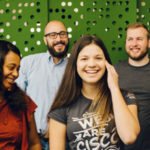
I’m approaching my 10th anniversary at Cisco – my #Ciscoversary! When I look back at the amazing journey I started as a fresh graduate engineer full of insecurities about joining a world networking leader, I can confidently say this last year has been the one that has made me grow the most both professionally and personally.
It all started during the maternity leave of my second son, when I took the time to read about hidden disabilities, or as I like to think of them, “hidden super powers.”
My passion for people and technology has always been a driver in my career. I am today the proud manager of a great team of 20 engineers in the Technical Assistance Center (TAC) organization in Brussels, but Cisco has also given me the opportunity to be very much involved in Inclusion and Collaboration (I&C) activities. So when I became aware of the world of hidden disabilities, I immediately realized the great opportunity ahead of me to make a difference at Cisco.
Hidden disabilities are disabilities that are not immediately apparent or obvious. Having a disability may not affect your job performance, but it can affect daily living, aspects of your work and personal relationships. Depending on the disability, people may need job accommodations to perform the essential functions of their job.
It is estimated that 20% of people in the U.S. (64 million people) have a medical condition that could be considered a type of hidden disability. In the UK, Government statistics cite figures indicating 1 in 6 (16% or 11 million) of the current overall UK population are disabled. The Australian Bureau of Statistics Survey of Disability, Ageing and Careers reported that 4 million people in Australia or 18.5 per cent of the population have one or more disabilities. These numbers keep increasing year over year as better methods to diagnose become available.
These numbers truly opened my eyes to realize that we all work with and interact on a daily basis with people affected by hidden disabilities.
The challenge in today’s workplace is that if a disability is not observable, many people have difficulty understanding the need for adjustments or identifying concrete actions to be taken.
This is what encouraged me to create an awareness campaign for Cisco, to precisely help overcome that challenge. I use the campaign to share information on the disabilities themselves and removing some stigmas and myths, how they affect the individual and small tips on reasonable accommodations that can be provided to improve work conditions and relations.

Every month I publish information about one hidden disability, and I open a forum to allow people to share their very own experiences. If you ask me what is the most rewarding part of this work, it is reading the testimonials that are shared every time by our incredible people at Cisco. Amazing stories in first person from people that are true examples of how successful you can be despite being affected by hidden disabilities, truly inspiring stories of parents that have helped their children to overcome their challenges, or people that are embracing the message and applying the recommendations on their daily job with their colleagues and reports. I cannot thank enough all these people for being so generous to share their experiences and make this campaign as relevant and as human as it can be.
It is vital for me every time to highlight all the positive aspects that these hidden disabilities bring to the individuals as well, calling out the strengths associated to some of the conditions, because as I mentioned, these are super powers that deserve to be known, specially when it comes to ensuring that we allow them to be at their best and play on their strengths in the workplace. It is all about making it more inclusive and collaborative!
Color blindness, dyslexia, autism, hearing impairment, dyscalculia, epilepsy and ADHD (Attention Deficit Hyperactivity Disorder) are just some examples of the hidden disabilities I have covered to date… but there are 20 more in the pipeline that I am so much looking forward to cover, and continue contributing to making Cisco an even greater place to work!
I am very fortunate to work for a company like Cisco where you get so much support at all levels from colleagues, managers and executives to invest time and devote efforts in your passion beyond your daily job. And getting recognition for it like in my case was receiving the Q2 Services Excellence award for Bringing the People Deal to Life is yet another demonstration of this support and encouragement to always make a difference at Cisco.
Come apply at Cisco, where you can make a difference too!


How many of us have given the “stink eye” to someone parking in a handicapped space? We all have physical, and mental, challenges. Some are obvious; most aren’t. Thanks for taking up this cause to shine a light on this issue – the people who suffer eye rolls, huffs of impatience or the dreaded “stink eye.”
I loved this post, Mayte and LOVE the work you’re doing! As someone who has a pesky hidden disorder, I’m certainly sensitive to those not taking just a few minutes to wonder if there’s more than meets the eye. Across the board, disability or not, our world could use a lot more understand and compassion.
I once had a professor who said, “You never know who’s on their way to the hospital” — it was sparked during a conversation about terrible drivers. His point was someone who may have accidentally cut you off? May be on their way to the hospital. Someone who forgot their blinker? May have just gotten terrible news earlier in the day. You just NEVER know.
So I like to give people the benefit of the doubt — because I have NO IDEA what path they’re walking. It’s something I think everyone should consider before every crossing the inconsiderate/rude line.
Wonderful post, I’ll be looking out for your work, I think you help to understand that being disabled is not a binary concept but a continuum. So it’s much more interesting to focus on our abilities, rather then disabilities. Thanks for your leadership Mayte!
The work Mayte has been developing is life changing.
I don’t understand why the easy button in life to ‘feeling good’ is about feeling better than others, and disregarding those who are different. It maybe an outcome of the insecurities and fear that we all go through as we grow up.
At Cisco, I am honored to work with people who assume the best of all and appreciate the diversity of thought and approac that we all bring to the table.
So inspiring, thank you Mayte!
Great post Mayte, and great work you do in bringing to our radar the disabilities our colleagues may have, but are not visible to us. Your work teaches us a lot.
brilliant post Mayte, my Dad is quadraplegic following on from a stroke and there are so many questions from others wondering if his mind is still working. Brilliant idea highlighting that the mind is perfect even with a very obvious disability, however it certainly has opened my eyes to hidden disabilities also.
This is wonderful to hear. I have a mild brain injury caused by encephalitis a few years ago. It is indeed “invisible” except to me and to those who know me well and what I was capable of before. It would be great to work at a place like Cisco that provides simple, minor accommodations so I could always perform at my best. Thanks and great job!
Thanks Mayte for the wonderful work you’re doing, making us all aware of what would otherwise remain ‘hidden’. As HR Manager I often speak to employees who open up about some of the challenges they’re facing, I’m glad when I can point them to your work & have them experience they’re not alone in their workplace with their struggles. Great job!
Hi Mayte,
Love the blog 🙂 thanks for sharing all this information
What a great post, lets keep it up!
Thank you Mayte.